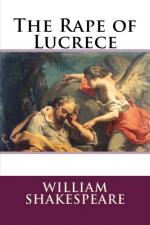|
This section contains 11,438 words (approx. 39 pages at 300 words per page) |

|
SOURCE: Woodbridge, Linda. “Palisading the Elizabethan Body Politic.” Texas Studies in Language and Literature 33, no. 3 (fall 1991): 327-54.
In the following essay, Woodbridge examines the subject of bodily violation as a symbol for military invasion and conquest in The Rape of Lucrece, Titus Andronicus and Cymbeline. Woodbridge asserts that all three works reflect England's fear of foreign conquest and its identification with ancient Rome.
That island of England breeds very valiant creatures.
—Henry V
To island dwellers like the Elizabethan English, Shakespeare's description of Lucrece's death must have held a peculiar horror:
And bubbling from her breast, it [the blood] doth divide In two slow rivers, that the crimson blood Circles her body in on every side, Who, like a late-sack'd island, vastly stood Bare and unpeopled in this fearful flood. Some of her blood still pure and red remain'd, And some look'd black, and that false Tarquin stain'd...
|
This section contains 11,438 words (approx. 39 pages at 300 words per page) |

|


